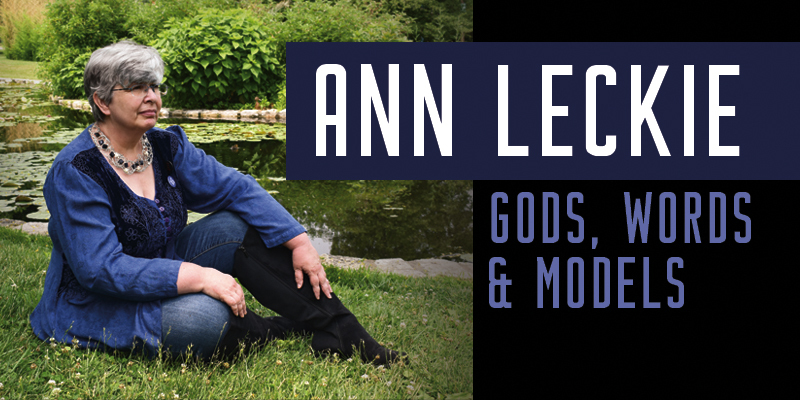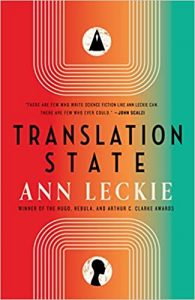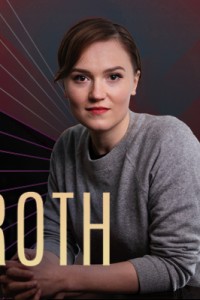Ann Leckie: Gods, Words & Models
 ANN LECKIE was born March 2, 1966 in Toledo OH and grew up in St. Louis MO. She attended Washington University, graduating with a degree in music. She has worked as a waitress, a receptionist, a rodman on a land-surveying crew, and a recording engineer.
ANN LECKIE was born March 2, 1966 in Toledo OH and grew up in St. Louis MO. She attended Washington University, graduating with a degree in music. She has worked as a waitress, a receptionist, a rodman on a land-surveying crew, and a recording engineer.
Leckie attended Clarion West in 2005, where she wrote her first published SF story “Hesperia and Glory” (2006). Over a dozen stories have appeared since, including three in collaboration with Rachel Swirsky.
Her debut novel, Ancillary Justice (2013), won Arthur C. Clarke, British SF Award, Hugo, Locus, and Nebula Awards, and was nominated for Tiptree, Philip K. Dick, and Compton Crook awards, among others. The novel launched the Imperial Radch series, which includes Hugo and Nebula Award finalists and BSFA and Locus Award winners Ancillary Sword (2014) and Ancillary Mercy (2015), Hugo Award and BSFA finalist Provenance (2017), and her latest novel, Translation State (2023). Her standalone fantasy The Raven Tower (2019) was a Hugo Award finalist, but she declined the nomination; it was also a World Fantasy Award nominee.
Leckie founded online magazine GigaNotoSaurus in 2010 and edited it until stepping down in 2014. She was an assistant editor at podcast magazine Podcastle until 2014, and served as secretary of SFWA from 2012-13.
She lives in St. Louis MO with her family.
Excerpt from the interview:
 “I worked on Translation State during 2021. During 2020, there was no way I was writing anything. For that first year, I was like, ‘There’s no way,’ and I realized very quickly, just looking online, that everybody else was in the same boat; nobody was writing anything to speak of. So I was sitting there, playing Minecraft and Stardew Valley, and reading books, and all of a sudden I thought, ‘Oh, there’s… this story.’ I started poking around at the idea, and then I finally sat down to start writing it. Really, I just started from those two characters’ situations, and I said to myself, ‘I’ve never done a book with more than one POV… so why don’t I do more than one POV?’ I got pretty far along and I was like, ‘Let me just write an outline and I’ll send it to my agent.’ That worked out really well. A lot of times, you’re trying to get a book into shape, and figure out what you’re writing about, but for this one, I was just having a good time: ‘This is fun to write!’ Qven was such a fun character.
“I worked on Translation State during 2021. During 2020, there was no way I was writing anything. For that first year, I was like, ‘There’s no way,’ and I realized very quickly, just looking online, that everybody else was in the same boat; nobody was writing anything to speak of. So I was sitting there, playing Minecraft and Stardew Valley, and reading books, and all of a sudden I thought, ‘Oh, there’s… this story.’ I started poking around at the idea, and then I finally sat down to start writing it. Really, I just started from those two characters’ situations, and I said to myself, ‘I’ve never done a book with more than one POV… so why don’t I do more than one POV?’ I got pretty far along and I was like, ‘Let me just write an outline and I’ll send it to my agent.’ That worked out really well. A lot of times, you’re trying to get a book into shape, and figure out what you’re writing about, but for this one, I was just having a good time: ‘This is fun to write!’ Qven was such a fun character.
“I made the mistake of looking at Goodreads and seeing what people thought about the ARC, and some people said, ‘Oh, the cannibalism was really off-putting.’ At first I was like, ‘Cannibalism…? Oh, that!’ I had n’t c o n s i d ered it off-p u t t i n g ; I was just like, ‘Well, this is Qven.’ I guess it says something about me that I just put that in…. It ’s mos t l y not onstage. I think it gives a nice little jar to the reader without it being too much. I just found it si l ly a nd fun and lighthearted; looking back, I’m like, ‘Wow, that is not silly or fun or lighthearted.’
“The whole meeting of the Siblings of Hikipu in the book – I’ve seen those kinds of meetings. My mom’s family is Irish Catholic, and I was thinking very consciously about the folks I know who are really into being Irish. They’re really into being Irish in a way that was not alarming to me at the time because I grew up with it, but as an adult looking back, I’m like, ‘Whoa.’ It was, of course, at one time, pretty common for Irish Americans to go to those events – ‘Yay, we’re all Irish Americans, and we’re giving money for the widows and orphans in Northern Ireland,’ and of course, that money would buy guns for the IRA, which I was completely unaware of when I was a kid. Adults that I knew spoke shockingly callously about the victims of IRA bombings and shootings. I know where that’s coming from, and in some ways I sympathize, but mostly, I don’t. No, they shouldn’t be there; no, they shouldn’t have treated Irish Catholics the way they did; no, we shouldn’t be killing people.
“But I was thinking about that situation when I was constructing the whole business with the Hikipi. That group is very much like people who are way too into being Irish Americans, and should have other things going on in their lives. I’m making fun of it now, but those identity groups can do a lot of good when they’re not running guns to places. They are an important source of finding community, especially if you don’t have a close family, or if that’s the way you construct your family identity. And so, I understand Reet’s situation, and I don’t blame most of the members of the Siblings of Hikipu for relating to Reet the way they do. Nadkal is a whole other bucket of wax.
“I started writing Translation State two years ago; it’s been having publisher things done to it for a year. Now, I’m talking Translation State when I haven’t thought about Translation State for months… and that’s just how it is.
“I like working with multiple timelines. One of the fun things about Ancillary Justice was having the past and the present timeline, and there’s something fun about getting contrasts out of different chapters. Although I like Ancillary Sword and Ancillary Mercy and Provenance a lot, there’s just something fun about being able to switch it up between sections and feel those different threads play off each other.
“I do like the playground of the Radchaii universe, and my publisher does, too. This contract was for two books, and the second book had to be in the Radchaai universe; that was what my publisher wanted. I have to admit I pulled a fast switch on them with my previous contract, which was supposed to be for Provenance and another untitled science fiction novel, I ended up presenting them with a fantasy, Raven Tower, and that got switched out for the second book in that contract. I think they would have preferred another science fiction novel from me.
“Raven Tower is in the same universe as most of the short fiction that I have sold. Nobody paid much attention to my stories. To the extent that anybody paid attention to my short fiction – which wasn’t many people, and short fiction is already a club scene to begin with – the folks who have read my short fiction were assuming I was going to write a fantasy novel and were disappointed with me for writing science fiction. When my first book Ancillary Justice came out, people were talking about nominating me for the Astounding Award for Best New Writer, and I was like, ‘Don’t waste your nomination slots because I am not eligible for that award. I haven’t been eligible for like five years!’ So few people knew I’d been publishing short fiction.
“There are so many great folks writing short fiction. I think that’s probably always true. When I was writing short fiction, I knew who everybody in the field was. I knew every single magazine that was worth submitting to, and I knew the names of many of the ones I didn’t consider to be worth submitting to. I knew who edited all of them, I knew their submission guidelines, I knew how much they paid, I knew all of those things. And now I’m out of it. I see somebody say, ‘Oh, I sold a story to Clown Tales,’ and I’m like, ‘Is that a good sale? I don’t know? Congratulations!’ It doesn’t make sense to spend much time on short fiction once you start writing novels.
“You’re building a whole structure for a novel, but you have to build a whole structure every time you do a short piece too – that’s a lot of work, right? And it should be. Someone who shall remain nameless once said, ‘Oh, it isn’t worth putting that much work into a story, because you’ll only make X amount of money, and it isn’t worth it when you break it down by how many hours you spend.’ No. That’s not how art works, at least not for me. It would be wonderful if short fiction paid enough, but currently…. There was a time, I’m given to understand, where you could make a living doing short fiction, but we are not living in those times.
“There’s an idea that if you’re good enough, you’ll succeed, or, if you write enough, you can get good enough, and then you’ll succeed. You will get better, if you write enough you can become very good. I have absolute faith that that part is true, but everything else is a question of fate and luck, and it’s a complete roll of the dice.
“Artists of all kinds deserve to create their art and not have to worry about where their food comes from. I wish we lived in a society with universal basic income, and/or single-payer healthcare, so that people could make their art. But unfortunately that’s not the world we’re living in. Even so, when I talk about writing advice, I tell folks they should write the thing they want to write, the thing that is going to make them happy to write, the thing they wished they would see on the shelves – because that’s the only thing they can control. You can’t control how anybody else is going to respond to your work, so you just have to make it as good as you can, and then let the universe take care of the rest.
Interview design by Stephen H. Segal
Read the full interview in the July 2023 issue of Locus.
 While you are here, please take a moment to support Locus with a one-time or recurring donation. We rely on reader donations to keep the magazine and site going, and would like to keep the site paywall free, but WE NEED YOUR FINANCIAL SUPPORT to continue quality coverage of the science fiction and fantasy field.
While you are here, please take a moment to support Locus with a one-time or recurring donation. We rely on reader donations to keep the magazine and site going, and would like to keep the site paywall free, but WE NEED YOUR FINANCIAL SUPPORT to continue quality coverage of the science fiction and fantasy field.
©Locus Magazine. Copyrighted material may not be republished without permission of LSFF.







